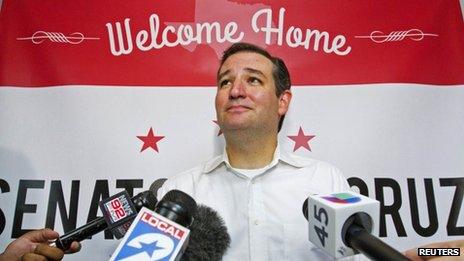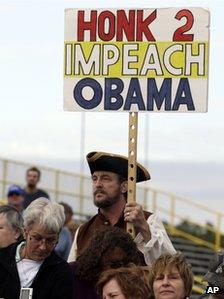Mark Mardell: Why America doesn't work
- Published
Mardell shutdown
"We'll stop him in this country," Legate said. "Even if he calls himself George Washington." "How?" Edmonds said. "By singing God bless America in bars at midnight and wearing dime-store flags in our lapels?"
- Delta Autumn by William Faulkner
There are those who scorn the idea that the American government is dysfunctional.
Despite the fact that it left the world teetering on the edge of an economic catastrophe, they say everything is working just fine.
As one Tea Party supporter told me, it is designed to produce "gridblock". He's right, but it doesn't mean it's desirable.
I've been trying to find out for BBC 1's The Editors programme what propels America into perpetual crisis.
I hadn't been in this town very long before people were telling me, "it didn't used to be like this in the old days."
In days gone by, they said, politicians could fight like cats and dogs during the day but cosy up over the bourbon come nightfall. Then the deals were done.
'Growing further apart'
What they fail to tell you is that back in those days their granddaddies would probably both agree the guy serving their drinks shouldn't be allowed to vote.
America's twisted history bore strange political fruit.
To British or European eyes American political parties used to be a bit of a muddle.
The Democrats were to an extent the party of the workers. But they were also the party of Jim Crow laws, the rural South and deep social conservatism.
The Republicans were the party of big business, but many of them were pretty liberal by the standards of the day.
But since Democrat Lyndon Johnson passed sweeping civil rights legislation and the Republicans adopted their Southern Strategy, they have been gradually springing back into the shape familiar to us today.
But those divisions of left and right are sharper and deeper than in many other countries. And they're growing further apart.
'Don't fit in'

Senator Ted Cruz is one of the leading figures in the Tea Party's 'revolt of the grass roots' - and may harbour presidential ambitions
The Republican Party has gradually become more and more conservative.
The Tea Party may be a new name, but the resentful, righteous, romantic right has long been a force in American politics.
What is different now is that they have much more power.
Ted Cruz calls it the revolt of the grass roots. It is partly due to redistricting, or gerrymandering, which creates very safe seats for both parties.
It's meant that in states like Virginia - which voted for Democrats in the Senate and White House - the Republicans completely dominate the state's delegation in the House of Representatives.
Then throw into that mix the party primary election system, which means politicians disliked by activists can be targeted and slung out of office - the Tea Party has used this to huge effect.
Those they see as wishy-washy have been removed, their replacements sent to Washington with the message "don't fit in, fight".
Apparent dysfunction
There is little reason for them to give a fig for the views of the middle ground or to search earnestly for compromise. It might be for the good of their country, but it would damn their careers.
The Tea Party is one symptom of a divided America.
In Europe, for good or ill, the parties of left or right came to a grand bargain that the rougher edges of capitalism would be sanded off by a dose of big government and the welfare state.
The US has never made that accommodation. The US is not just changing, it is still becoming.
Although calling Obama a "socialist" sounds daft to our ears (he's a pretty right wing social democrat), it is exactly how many conservatives see him.
The two parties have a very different vision of what America means, and what it should be.
In most democratic systems, that would make for a very fractious, very angry opposition. But here it's another thing, perhaps the main factor, in America's apparent dysfunction.
The Republicans in the House are not some angry faction of the opposition. They are automatically part of the government.
Winner takes all

The Tea Party
In the British first-past-the-post system, the winner takes all and other parties can do little more than make their case.
Of course we have a coalition at the moment, the sort of government that is common on the continent.
In either situation, you don't get to become the government unless deals are made first and compromises swallowed, whether between parties or inside one party.
Unless you agree on basics, you don't get the fancy offices and the big titles.
In the US each branch of government automatically has that power, without that responsibility.
In our system, self-interest forces parties and factions together. In the absence of the mechanisms that do that, good will is the only glue.
It is in short supply in this town. So only looming crises can force the two sides into a deal.
It's true the system was deliberately designed this way. Long ago it was to keep states jealous of their rights, fearful of the federal government.
In reality, it served to keep the slave states happy for a long while, until it came to civil war.
After that it still functioned to keep the South satisfied and allowed them to block civil rights. American government's purpose is to allow a fractious minority to stop the will of the majority.
We shouldn't be surprised when it succeeds.